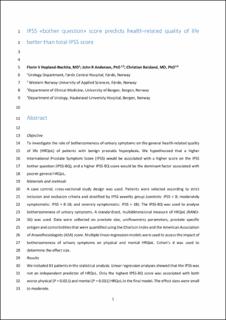| dc.contributor.author | Hopland-Nechita, Florin Vasile | |
| dc.contributor.author | Andersen, John Roger | |
| dc.contributor.author | Beisland, Christian | |
| dc.date.accessioned | 2023-04-18T13:32:43Z | |
| dc.date.available | 2023-04-18T13:32:43Z | |
| dc.date.created | 2022-05-11T11:22:49Z | |
| dc.date.issued | 2022 | |
| dc.identifier.issn | 0724-4983 | |
| dc.identifier.uri | https://hdl.handle.net/11250/3063624 | |
| dc.description.abstract | Objective
The objective of this study was to investigate the role of bothersomeness of urinary symptoms on the general health-related quality of life (HRQoL) of patients with benign prostatic hyperplasia. We hypothesised that a higher International Prostate Symptom Score (IPSS) would be associated with a higher score on the IPSS bother question (IPSS-BQ), and a higher IPSS-BQ score would be the dominant factor associated with poorer general HRQoL.
Materials and methods
A case–control, cross-sectional study design was used. Patients were selected according to strict inclusion and exclusion criteria and stratified by IPSS severity group (controls: IPSS < 8; moderately symptomatic: IPSS = 8–18; and severely symptomatic: IPSS > 18). The IPSS-BQ was used to analyse bothersomeness of urinary symptoms. A standardised, multidimensional measure of HRQoL (RAND-36) was used. Data were collected on prostate size, uroflowmetry parameters, prostate specific antigen and comorbidities that were quantified using the Charlson Index and the American Association of Anaesthesiologists (ASA) score. Multiple linear regression models were used to assess the impact of bothersomeness of urinary symptoms on physical and mental HRQoL. Cohen’s d was used to determine the effect size.
Results
We included 83 patients in the statistical analysis. Linear regression analyses showed that the IPSS was not an independent predictor of HRQoL. Only the highest IPSS-BQ score was associated with both worse physical (P = 0.021) and mental (P = 0.011) HRQoL in the final model. The effect sizes were small to moderate.
Conclusion
The IPSS-BQ score is an important predictor of HRQoL. The IPSS-BQ score as a proxy should be regarded as a standard outcome measure and reported in all LUTS-related research. | en_US |
| dc.language.iso | eng | en_US |
| dc.publisher | Springer | en_US |
| dc.title | IPSS “bother question” score predicts health-related quality of life better than total IPSS score | en_US |
| dc.type | Journal article | en_US |
| dc.type | Peer reviewed | en_US |
| dc.description.version | acceptedVersion | en_US |
| dc.rights.holder | Copyright 2022 Springer | en_US |
| cristin.ispublished | true | |
| cristin.fulltext | postprint | |
| cristin.qualitycode | 2 | |
| dc.identifier.doi | 10.1007/s00345-021-03911-2 | |
| dc.identifier.cristin | 2023437 | |
| dc.source.journal | World Journal of Urology | en_US |
| dc.source.pagenumber | 765-772 | en_US |
| dc.identifier.citation | World Journal of Urology. 2022, 40 (3), 765-772. | en_US |
| dc.source.volume | 40 | en_US |
| dc.source.issue | 3 | en_US |
